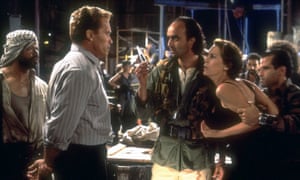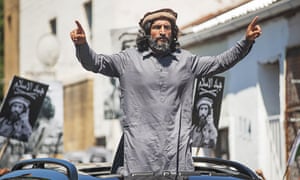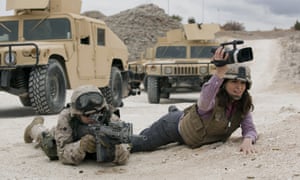Steve Rose. theguardian.com
The US government wants the movie business to help counter Isis propaganda. But from shady sheikhs to detonator-happy terrorists, Hollywood’s pervasive Islamophobia is already a big part of the problem
‘Great convo w studio execs in LA. Good to hear their perspectives & ideas of how to counter #Daesh narrative,” tweeted John Kerry on 16 February, along with a photo of himself in a Hollywood meeting lounge with executives from Universal, Warner, Fox, Disney, Sony, Dreamworks and other big players – overwhelmingly middle-aged white men in suits.
One can’t help imagining there were some awkward moments to this “great convo”, though. Especially if Kerry queried what Hollywood had done to counter the “#Daesh narrative” so far. Even more so, if he asked what juicy counter-terrorism stories they had coming down the pipeline. Looking at the current output, such as Whiskey Tango Foxtrot, Rock the Kasbah and London Has Fallen, you could easily get the impression that Hollywood is part of the problem, rather than a potential solution.
If you accept the notion of a “war of narratives”, it’s an area where the extremists have done most of the running. Still ringing in Washington’s ears and heading its PowerPoint presentations is the declaration the al-Qaida leader Ayman al-Zawahiri made in 2005: “We are in a battle, and more than half of this battle is taking place in the battlefield of the media.” Isis/Daesh has been sending a steady stream of video content on to that media battlefield, the relative sophistication of which has filled western commentators with a mix of horror, concern and admiration. The US and its coalition partners have floundered over how to respond.
Kerry’s visit to Hollywood comes a month after the State Department revamped its Countering Violent Extremism programme. Since 2010, that role had been performed by the Center for Strategic Counterterrorism Communications (CSCC); its counter-messaging often leaned towards counter-productive messaging. One of its strategies, for example, was to engage directly with Isis jihadists on Twitter, but that only served to legitimise their voices. The CSCC also put out a parody recruitment video, repurposing Isis’s violent propaganda footage and broadcasting it under the seal of the State Department. “Run, do not walk to Isis land,” ran the text of the ad. “Travel is inexpensive because you won’t need a return ticket!” As the TV satirist John Oliver remarked: “You are banking a lot on any potential militants understanding that that is sarcasm.”
“If our message is that Daesh is a criminal organisation that represents a distorted view of Islam, the US government is not the best conveyor of that message,” says Richard Stengel, undersecretary for public diplomacy and public affairs in the State Department. “The best conveyors are local people and Muslims and clerics and NGOs. So, rather than be in the business of doing tit-for-tat tweets with Daesh, we realised that we have an expertise in funding and messaging. What can we do to empower, amplify, optimise the messaging that’s out there already? That’s the central paradigm shift.”
This is by no means the first time in the 21st century that the White
House has turned to Tinseltown. Just a month after 9/11, George W Bush’s top adviser, Karl Rove, convened a similar council of movie execs for a counter-terrorist pitching session, although it apparently came to nothing. There was no discussion of putting government propaganda into movies, it was reported. “Content was off the table,” said Jack Valenti, then head of the Motion Pictures Association of America.
House has turned to Tinseltown. Just a month after 9/11, George W Bush’s top adviser, Karl Rove, convened a similar council of movie execs for a counter-terrorist pitching session, although it apparently came to nothing. There was no discussion of putting government propaganda into movies, it was reported. “Content was off the table,” said Jack Valenti, then head of the Motion Pictures Association of America.
Content was also off the table at Kerry’s Hollywood trip, it appears. “It wasn’t about asking them to make an Islamic Harry Potter,” says Stengel. “It’s not like the cold war, trying to insert positive narratives into movies. It’s connected in the largest possible way to defeating Daesh. It was an opportunity to talk to these people who shape content around the world, who shape the American brand around the world. An opportunity to go to them and say: ‘What can you do to help?’ in what [Kerry] has called the generational struggle of our time.”
But if Hollywood has any meaningful role to play here, content is arguably exactly what should be on the table. Throughout its history, American cinema has employed a lamentably narrow set of stereotypes about Arabs and Muslims. “They’ve been the most vilified group in the history of Hollywood,” says the academic and author Jack Shaheen. His book Reel Bad Arabs surveys some 1,200 depictions of Arabs and Muslims in the movies. By his estimation, roughly 97% are unfavourable, coloured by orientalist myths, racist demonising and xenophobic paranoia. “At most, three dozen or so had balance, or what I would call positive images. In the rest of them, Arabs are either terrorists or shady sheikhs or people you would not want to associate with. Those images continue to pervade our psyches.”
There are too many egregious examples to list. Selected highlights would include True Lies (Arnold Schwarzenegger versus fanatical yet incompetent Palestinian terrorists, who detonate a nuclear device in Florida), Protocol (Goldie Hawn becomes concubine to a lecherous oil-rich sheikh, so that the US can build a military base in his country), Network (“The Arabs are simply buying us,” rails Peter Finch’s rebel presenter), and 1998 thriller The Siege (in which Arab-Americans are rounded up after a New York terrorist attack. The critic Roger Ebert wrote: “The prejudicial attitudes embodied in the film are insidious, like the antisemitism that infected fiction and journalism in the 1930s”). And special mention must go to William Friedkin’s 2000 thriller Rules of Engagement, in which Samuel L Jackson’s marine goes on trial for massacring a crowd of Yemenis, but is exonerated when it turns out they were all gun-toting evildoers, even the women and children.
Rules of Engagement was “probably the most racist film ever made against Arabs by Hollywood”, protested the Arab-American Anti-Discrimination Committee at the time. But then 9/11 happened and things became even worse. Old-fashioned Islamophobia is still thriving, as demonstrated by current release London Has Fallen, in which Gerard Butler saves the world from yet another brown-skinned, detonator-happy terrorist with an Arab-sounding name, and dispatches evildoers with lines such as: “Get back to Fuckheadistan, or wherever you’re from.” Meanwhile, counter-terrorism-themed TV series such as 24, Homeland, Sleeper Cell and NCIS reiterate the “all Muslims are potential terrorists” notion, with the added point that they’re on American soil now. “Hollywood and television have created an even more dangerous precedent by vilifying American Arabs and American Muslims in particular,” says Shaheen. “They’ve blended the old stereotypes from ‘over there’ with new stereotypes from ‘over here’.”
When Hollywood has made attempts to address the Iraq and Afghanistan conflicts directly, the casualty list has been high: Lions for Lambs, The Messenger, Stop Loss, Green Zone, In the Valley of Elah, Grace Is Gone, Redacted – all of them flopped at the box office. Even The Hurt Locker, with its Oscars and all-round acclaim, was greeted with widespread indifference by the American public, taking just $17m (£12m).
Only a handful of Afghanistan/Iraq films have struck a chord with US audiences: Zero Dark Thirty, detailing the hunt for Osama Bin Laden, made $95m domestically; Afghanistan action thriller Lone Survivor made $125m; and overshadowing them all is Clint Eastwood’s American Sniper, based on the real-life Navy Seal Chris Kyle, who holds the record for the most kills in US military history. It took more than $350m, making it the highest grossing movie of 2014 in the US.
When viewed through the prism of “countering the #Daesh narrative”, these movies make uncomfortable viewing. Zero Dark Thirty took a relatively nuanced approach to the war on terror, but controversially depicted Arabs being tortured. Both American Sniper and Lone Survivor narrowly focus on US military personnel and their efforts to kill nameless, faceless “bad guys”. Wider questions about American foreign policy, or how ordinary Afghanis and Iraqis felt about being invaded, are sidestepped in favour of heat-of-the-battle immediacy. In its opening minutes, American Sniper gets in the “all Muslims are potential terrorists” trope, as Kyle guns down a woman and a child who both try to attack US troops (the attack did not happen in real life). It gets worse from there on in.Not that the reality was much better. In his autobiography, Kyle wrote: “I only wish I had killed more. Not for bragging rights but because I believe the world is a better place without savages out there taking American lives.”
These are the narratives the US has been sending out on to this ideological battlefield. Shaheen is not alone in wondering what role they have played, not just in the rise of Isis, but in the decisions to invade Iraq and Afghanistan in the first place, not to mention the manner in which those wars were conducted, from the high levels of civilian casualties to atrocities such as those at Abu Ghraib. And how can these mythologies not play into the increasingly Islamophobic climate back home? Republican presidential nominees are presently engaged in an arms race of anti-Muslim rhetoric, against a background of vandalised mosques, threats, shootings and general discrimination. Isis’s own atrocities have contributed to this climate, of course, but homespun narratives seem to be fanning the flames. The release of American Sniper triggered a reported three-fold increase in anti-Muslim and anti-Arab threats.
“When you create this fear and it manifests itself in hate crimes, bias and bullying, then it alienates people,” says Humera Khan, the founder and executive director of Muflehun, a counter-violent-extremism thinktank. “Society is telling you: ‘You don’t belong.’ It is reinforcing what Isis is telling them.” Islamic extremists represent, at best, 100,000 people out of a worldwide Muslim population of 1.6 billion, Khan points out, but with the exception of the occasional token “good Muslim”, these are overwhelmingly the ones we see on our screens. She offers an analogy: “Imagine if you introduced someone to white people only by way of the Ku Klux Klan, but then said afterwards, ‘Oh, by way, there are some good white people out there, too.’”
In stereotyping Arabs and Muslims, the US also reinforces stereotypes about itself, Khan adds. Muslims around the world watch Hollywood movies, too – in greater numbers than Americans. “When these movies play in majority Muslim countries, the assumption is, ‘Look: they’re misrepresenting us again.’ So for the average person who’s not interested in Isis, the impression is: ‘America doesn’t like us.’ When you think about Isis’s message, that this is ‘a war against Muslims’, that’s exactly what they’re showing.”
Mirroring Washington’s recent shift in counter-messaging, Hollywood also seems to be taking a different tack: it is now coming at the Afghanistan/Iraq wars by way of comedy. Perhaps the studio bosses looked at their casualty list of box-office bombs and wondered if all that death, torture and moral complexity wasn’t putting people off. Having repeated the history as tragedy, Hollywood is repackaging it as farce.
Rock the Kasbah is an all-too-literal example of this. The movie, which is released in the UK this week, draws on the true story of Setara Hussainzada, a Pashtun teenager who bravely tested post-invasion waters by entering Afghanistan’s new X Factor/Pop Idol equivalent, Afghan Star (women singing or dancing was strictly forbidden under Taliban rule). Hussainzada was already the subject of a 2009 documentary, also titled Afghan Star, but in Rock the Kasbah, she’s discovered in a cave by Bill Murray’s jaded rock promoter. He puts her into the spotlight with the aid of some fellow Americans: a twitchy soldier, two corrupt arms dealers and a sympathetic prostitute, who operates out of a trailer on the edge of town. From a “#Daesh narrative” perspective, they could represent the horsemen of the apocalypse, but the comic tone places the gruesome realities of war well in the background. As one review put it: “Rock the Kasbah gives the impression that the nation’s ideological rebirth would have been impossible without the gumption of a hasbeen music manager learning to shed his cynicism.”
It’s a similar story with Whiskey Tango Foxtrot, which opened in the US this weekend. Again, the plight of war-ravaged Afghanistan is largely window-dressing for the journey of our war-reporter heroine, Tina Fey, a fortysomething singleton who is pitched into the battlefield and the hard-partying expat “Kabubble”. One character lets the cat out of the bag by describing it as “the most American-white-lady story I’ve ever heard”. A few Afghani characters do get speaking parts in Whiskey Tango Foxtrot. One is a clownish local politician, basically a standard-issue “lecherous Arab”, played by the British actor Alfred Molina. The other, Fey’s Afghani helper, Fahim, is that rarest of things: a male Muslim movie character who is intelligent, educated, empathetic and not the slightest bit lecherous. That bad news is he’s played by an American actor, Christopher Abbott, best known as Charlie out of Girls.
For Hollywood, it can look like a case of “damned if we do, damned if we don’t”. Either they take a purely US-centric point of view and dehumanise Arabs and Muslims – which plays right into the #Daesh narrative. Or they take a critical look at the US’s military and foreign policy failings – which also plays into the #Daesh narrative. What are they supposed to do?
A good start, says Shaheen, would be to stop perpetuating the same blinkered, divisive rhetoric as our enemies. It wouldn’t take much. “There really needs to be a couple of blockbuster films that squash these stereotypes, as well as some responsibility on the part of our political leaders, who are encouraging voters to hate their fellow Americans. It has to come from the top.” He cites the way Hollywood cleaned up its act with regard to racist depictions of African-Americans, Jews and LGBT characters.
Khan agrees: “If they were just more responsible in their portrayal of Arabs and Muslims, that would actually help the environment on the ground.” What happens on the ground, in Syria and Iraq especially, is obviously paramount if anything is to change, but movies absolutely have a role to play. “Is any narrative going to be sufficient? No. Is this a necessary part of this landscape of needs? Yes.”
Just as the US likes to think of itself as the world’s policeman, it is also unquestionably the world’s storyteller. That narrative supremacy comes with certain responsibilities, now more so than ever.
In the meantime, we can take comfort from the fact that even jihadis can’t resist a good movie. On the day of Robin Williams’s death in August 2014, a self-professed online “diplomat for Isis” named Abdullah (AKA @Mujahid4Life), tweeted: “#RobinWilliams is dead? Weird. Grew up watching his movies.”
Another user replied that he liked Jumanji.
“Good movie,” Abdullah replied. “Loved it as a kid.”





No comments:
Post a Comment